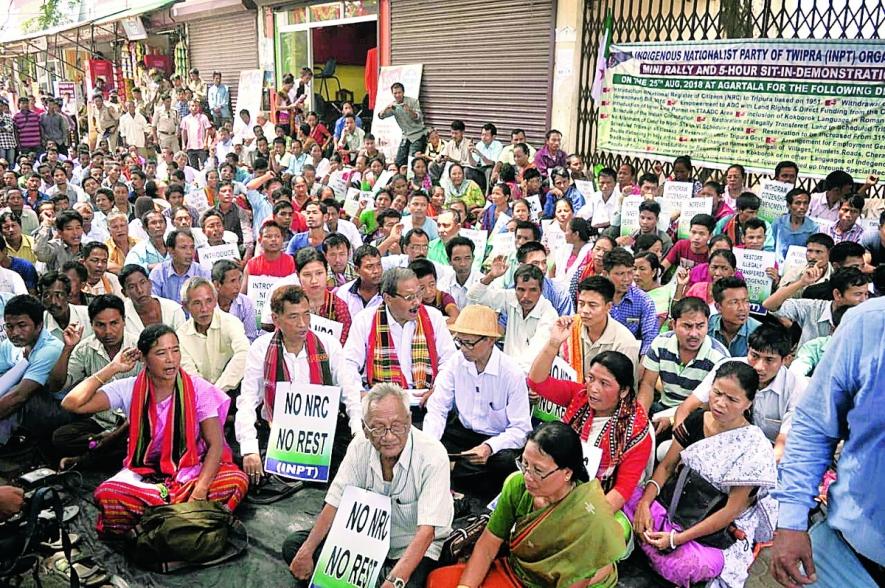Tripura: NRC Could Reopen Old Wounds

INPT activists demanding NRC in Agartala | Image Credit: Pranab Shil, The Telegraph.
Tripura may witness a major rift following the Supreme Court of India’s decision to attach a petition filed by the People’s Front of Tripura with the one which enabled Assam’s National Register of Citizens (NRC). In a recent development, the descendent of the erstwhile kingdom’s former royals, Pradyot Bikram Maikya Debbarma, has filed an affidavit in the Supreme Court in favour of the NRC. However, the petition is only an additional indicator of the existing fault-lines in the state.
At present, Tripura is ruled by a de facto Bharatiya Janata Party (BJP) government. Though they have formed the government in an alliance with the Indigenous People’s Front of Tripura (IPFT), the BJP, by virtue of their numbers, are in the driving seat. This alliance has bred discontentment among the members of the IPFT, who, according to Scroll.in, have voiced feelings of having got a ‘bad deal’. The seat-sharing alliance enabled the IPFT to field candidates for nine seats reserved for Scheduled Tribes (ST), while the BJP contested the remaining eleven. Both parties lost in one ST constituency each to the Communist Party of India (Marxist) (CPM).
The IPFT’s main poll plank for their campaign was to attain statehood for the Tripura Tribal Autonomous Areas District (TTAAD) areas in the form of Twipraland. They used this same promise when campaigning for the BJP’s ST candidates. However, prior to the alliance, the BJP’s broker for alliances in the Northeast, Himanta Biswa Sarma, made it clear that the party would not support the statehood demand. Undeterred, the alliance went ahead, despite signs of cracks appearing on several occasions. These cracks have translated into discontent on the ground.
Also Read | NRC Demand in Tripura: Do The Tribal Parties Have A New Political Weapon?
Before the BJP-IPFT government took charge in Tripura, the state had been grappling with high levels of unemployment. The Left Front government had been able to implement Mahatma Gandhi National Rural Employment Guarantee Act (MGNREGA) successfully. Tripura, at the time, had provided an average of 94 man-days of work under the Act, the highest in the country. However, when the BJP government came to power at the centre, funding for MGNREGA work almost ceased. Thus, the number of man-days of employment Tripura could provide dropped to an average of 42 in 2017. This has led to employment generated by MGNREGA drying up, and the situation has not improved since.
On September 16, Tripura Infoway reported that former Chief Minister Manik Sarkar and Member of Parliament (MP) Jitendra Choudhury raised concerns of starvation in remote tribal areas due to MGNREGA work drying up. They alleged that people living in the more remote areas near Bangladesh were crossing the border to find employment. Though the state government has vehemently denied these allegations, the lack of employment opportunities including under MGNREGA cannot be denied.
Also Read | Bru Refugees in Tripura Set To Starve Before Repatriation
On August 6, Tripura Chief Minister Biplab Deb rubbished reports that he was born in Bangladesh. The reports originated from his Wikipedia page which had been edited. However, when he assumed office, on March 4, the Dhaka Tribune had reported that his parents migrated to Tripura during the Bangladesh Liberation War. This indicates that they had come after the cut-off date mandated for Assam. This, in itself, is immaterial, as the petition filed by Tripura People’s Front has demanded 1949 to be the cut-off year in line with Article 6 of the Constitution. Ironically, Biplab Deb announced his support for the NRC on October 7, based on whether it succeeds in Assam. This is at variance with his earlier stand on July 31 where he had said that Tripura does not need an NRC.
The Union Home Ministry on September 4 announced the creation of a committee to study the social, economic, culture and linguistic issues of the tribal people in Tripura. However, this has resulted in discontentment among the some of the proponents of Twipraland, since they demanded that the terms of reference revolve around the feasibility of their statehood demand.
Also Read | BJP Govt in Tripura Cancels Registration of 40-Year-Old CPI(M) Newspaper
On October 4, the Indigenous Nationalist Party of Tripura (INPT) approached the Union Home Ministry, demanding that the NRC also be updated in Tripura. The Home Ministry reportedly has remained non-committal about it.
The NRC demand gained traction in Tripura’s political landscape following the publication of the final draft in Assam. Himanta Biswa Sarma at the time dismissed the thought of it, stating that the process in Assam originated in the Assam Accord; however, the situation in Tripura does not warrant updating the NRC. This is an ironic statement since the example of Tripura has been raised time and again across the Northeast when one talks of immigration.
In this situation, one can see that the tribal groups championing an ethnocentric cause are in a quandary. There is little to no consensus regarding their direction. While there is support for creating Twipraland, one cannot be sure whether there is support for updating the NRC. If the number of tribal people left out of the final draft of Assam’s NRC is an indicator, the same could happen in Tripura. The IPFT rode the Twipraland statehood wave into the assembly, yet they are unable to make any headway since their alliance partner is against it.
Therefore, on the one hand, the economic distress in the state has worsened after the BJP came to power. On the other hand, ethnocentric groups have begun lobbying more aggressively. One may not be wrong to presume that Tripura will likely witness old wounds reopening after a tenuous peace since AFSPA was withdrawn in 2015.
Get the latest reports & analysis with people's perspective on Protests, movements & deep analytical videos, discussions of the current affairs in your Telegram app. Subscribe to NewsClick's Telegram channel & get Real-Time updates on stories, as they get published on our website.
























